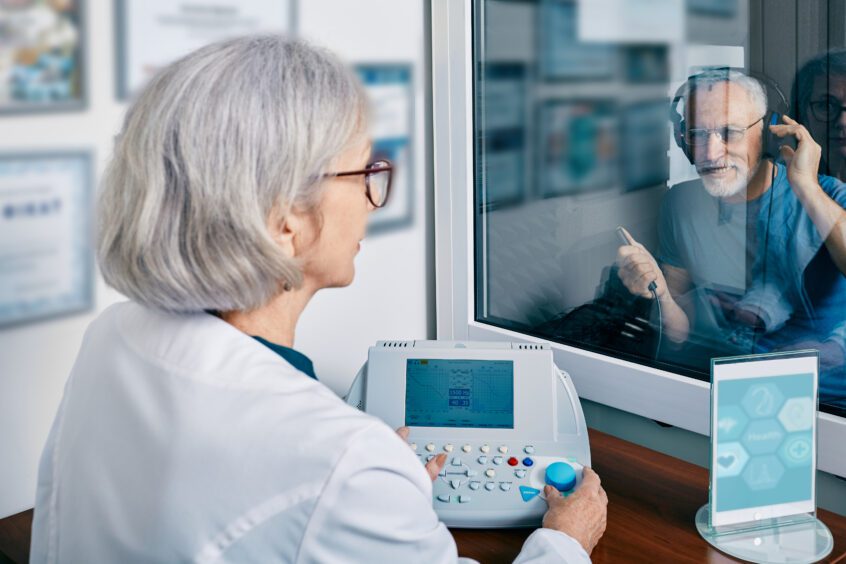Consumers often get mailings or see ads online promoting a free hearing test. Statements like, “Don’t pay for an expensive hearing test when you can get one for free,” or “We offer a no-cost hearing test,” sound too good to be true, and they are. In this blog, we’ll look at hearing tests and why it’s important to understand exactly what the advertiser is offering.
Aren’t All Hearing Tests the Same?
If you’ve never had an in-person diagnostic hearing evaluation performed by a hearing professional, you may think a hearing test is a hearing test, but that’s not the case.
Think of the words hearing test as an umbrella or generic term that can describe both a hearing screening and a comprehensive hearing evaluation, but there’s a vast difference between the two.
A hearing screening is simple test that may consist of a few questions you answer, or may include an online screening done at home where you wear your own earbuds or headphones to listen to different sounds and respond to what you hear. These tests usually just take a few minutes. The paper tests are a very rudimentary way to screen for hearing loss. The online tests where you actually listen to sounds also are just screenings meant to give the consumer a general idea of whether they do or don’t have a hearing loss.
Screenings are often offered at health fairs or community events, and online tests are plentiful, but are not all the same. Only use an online test if it’s offered by a reputable audiology practice or a professional audiology organization, and even then, remember it’s just a screening.
A Diagnostic Hearing Evaluation
If your hearing screening indicates you have a hearing loss, you should schedule an in-person diagnostic hearing evaluation with a hearing professional, such as a doctoral-level audiologist.
While a screening can provide a rough indication of a problem, it doesn’t include the level of detail an audiologist needs in order to diagnose and treat a hearing loss.
That’s why when you schedule an in-person appointment with an audiologist, you’ll have a diagnostic hearing evaluation. This is the gold standard of care in determining whether an individual has a hearing loss and usually takes an hour to an hour and a half to complete.
For accuracy, a diagnostic hearing evaluation should be conducted in a sound-treated room using special earphones and equipment that has been calibrated to national standards. The hearing evaluation begins with a thorough discussion about your symptoms, medical history, medication review and any other concerns you may have. Depending on your hearing loss symptoms and case history, the audiologist may perform several different tests, which may include the following:
- Otoscopic examination to evaluate the status of your outer ear, ear canal, and eardrum.
- Tympanometry/Immittance testing to reveal the status of your middle ear system.
- Air conduction and bone conduction threshold testing to determine the softest sounds you can hear at different frequencies. This testing also reveals the type, degree, and configuration of your hearing loss. It is more than a hearing screening.
- Word recognition testing to assess your ability to understand speech when the volume of the speech signal is adequate for your level of hearing.
- Otoacoustic emission testing to differentiate sensory (inner ear) from neural (nerve) hearing loss.
- Loudness discomfort testing to measure your ability to tolerate loud sounds and identify the presence of decreased sound tolerance.
Following the testing, the audiologist will explain the results to you, usually in the form of an audiogram, and will answer any questions you may have. An audiogram is a graph which gives a detailed description of your hearing ability and which can be described as a picture of your sense of hearing.
If the results indicate your hearing is within normal ranges, the audiologist will likely recommend a follow-up schedule that’s appropriate to monitor your hearing, depending on the test findings, as well as your age and general health.
If the audiologist finds you have a hearing loss, they will offer more information about your hearing loss, and can make recommendations for prescription or over-the-counter hearing aids based on your needs, lifestyle and budget.
Remember, an in-person diagnostic hearing evaluation is the gold standard to determine whether you have a hearing loss, and if you do, the best way to treat it. In many cases, if the test is ordered by a physician, the cost may be covered by your insurance plan, after deductibles have been met.
The Associated Audiologists team can review your insurance benefits and can let you know what your plan will cover related to the diagnostic hearing evaluation and hearing aids.
So, don’t rely on a hearing screening to determine whether you have a hearing loss. Schedule an in-person diagnostic hearing evaluation to be sure you receive the gold standard of care.



